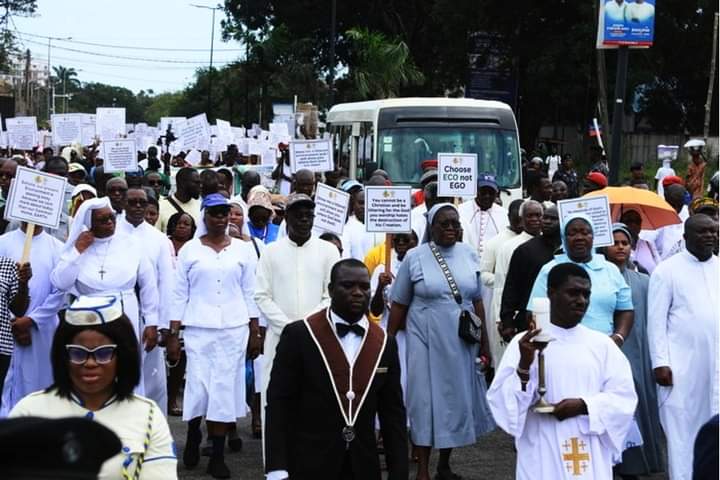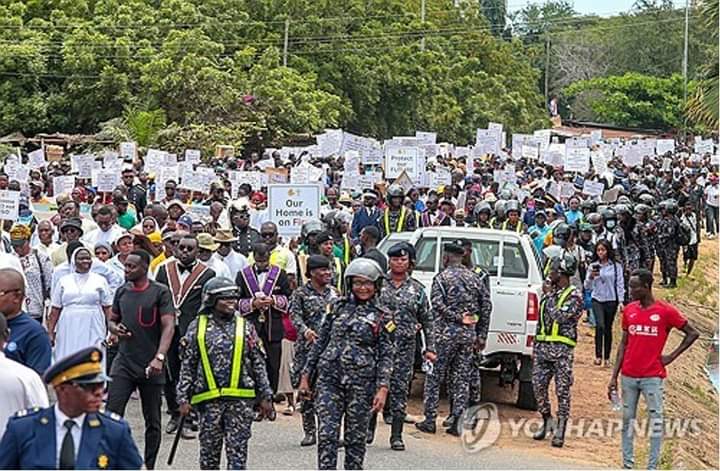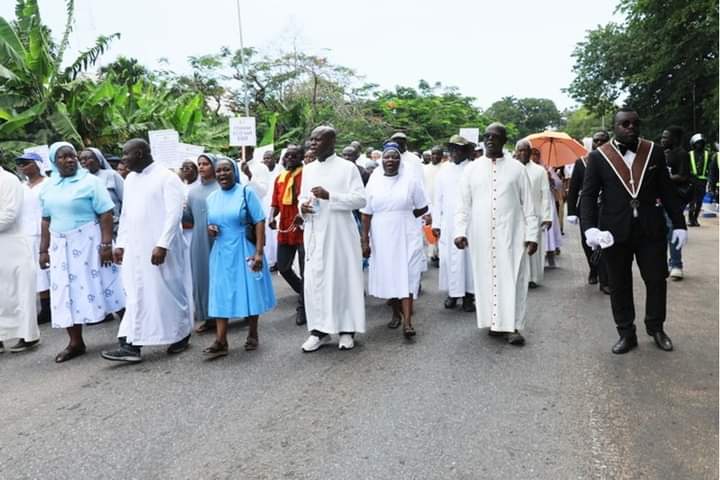Traffic in Accra reached its peak last Friday, 11th. If you were going to Accra through the Independence Ave, your best bet was the Nima Highway, if cattle were not on duty grazing. If you managed to pass 37 Hospital, thank your stars Democracy Hub had been relocated by Dampare, freeing the road for speeding okada boys flaunting their new crash helmets.
If there were any protestors, it was the historic spectacle of sacred nuns and men in cassock, who along with their flock had hit the streets, waving the cross and counting the rosary.
The Galamsey menace had bitten hard, pushing the clergy from the pulpit to the streets since several moves had failed to end Galamsey: warning gun shots, hot chases across the forest, burning of mining equipment, harsh jail terms, etc. In choosing the streets, pious men in cassock probably meant, ‘If force fails, use the Lord’s prayer.’
Church flock protesting Galamsey were multitudes: a motley congregation of priests, choristers in mufti, church elders, diocesans young and old, mass servers, plus intruding pedestrians possibly mistaking the procession for a march unto Zion. No war songs were heard, and neither the national anthem. The prescribed chorals were free style prayers, the Apostles Creed, Holy Mary, and the Lord’s prayer which the Christian soldiers chanted, inspiring the heavily armed Dampare Police to shepherd protestors away from the Jubilee security zone.

But the prayer walk was also a huge test for the Dampare police: how to handle a street march by men of God! What happens if a few hot blooded clergy get possessed and install illegal barriers on the highway, or throw a blow or two while reciting Psalm 23!
How does Dampare respond? Should his men apply ‘thy rod and thy staff, and also thy handcuffs?’ Happily I noted the safe distance maintained by the police shepherds ensuring that they did not touch God’s anointed. This also reminded me of a conference I attended 2010 in Madrid with Prof Joshua Alabi (then heading IPS, now UPSA), where our conference bus strayed into a public protest by Spanish women in nude! In other words women demonstrating in their birthday clothes! The male police on duty maintained a safe distance, but they were all in dark goggles, smartly protecting any rotating eyeballs.

The march started from the Holy Spirit Cathedral and ended at Christ the King Church across from the Jubilee House, where an anti-Galamsey petition was presented by leaders to the presidency.
If the President had been present to receive the memo himself, he would have been puzzled to note that the Catholic church presenting the petition, has kinship links with his own Anglican church. The breaking news could simply have been ‘the Anglican church has presented a protest note to the Anglican President, Nana Akufo-Addo.’
The political climate itself is so sensitive that our men in cassock made sure to identify themselves as the ‘Accra arch-diocese of the Catholic church;’ and this enabled the Catholic Headquarters to swiftly issue a press statement dissociating itself from the protesting ‘rebels.’
It simply meant, ‘At this time of the 4th Republic while we are heading towards elections, the main Catholic church itself doesn’t like any trouble ooo; Governments, please don’t visit any of our past sins upon the whole church.’

That was indeed an admission that the official Catholic Church has a history of battling bad governments with the cross; ‘but as for this Galamsey fight, the waters are so muddy we can’t risk soiling our cassocks.
But the spiritual world has other actors. A parallel battle is currently brewing among traditional priests (akomfo), who are also reported to be finalizing plans for a street protest on Galamsey at a shrine near you.
While Christian priests express concern about polluted rivers historically associated with baptism, our traditional priests also lament that rivers are sites housing their principal deities. In the scheme of Galamsey, these ritual sites have been rudely violated and tainted reducing the impact of spiritual invocations, and undermining spiritual welfare.
In one video I watched, a woman in the Eastern region was virtually in tears lamenting the pollution of the Brim river, making it more and more futile these days to pronounce curses on enemies.
While I pondered this troubled month of October, I heaved a sigh of relief when I learned that the Galamsey terrorists know their limits after all, and have not extended indiscipline to the most vindictive river in Ghana: the mystical Antoa River.
Antoa Nyamaa in the Ashanti region is still pure and clean, and quietly waits to be provoked by excavators.
kyankah@ashesi.edu.gh





















